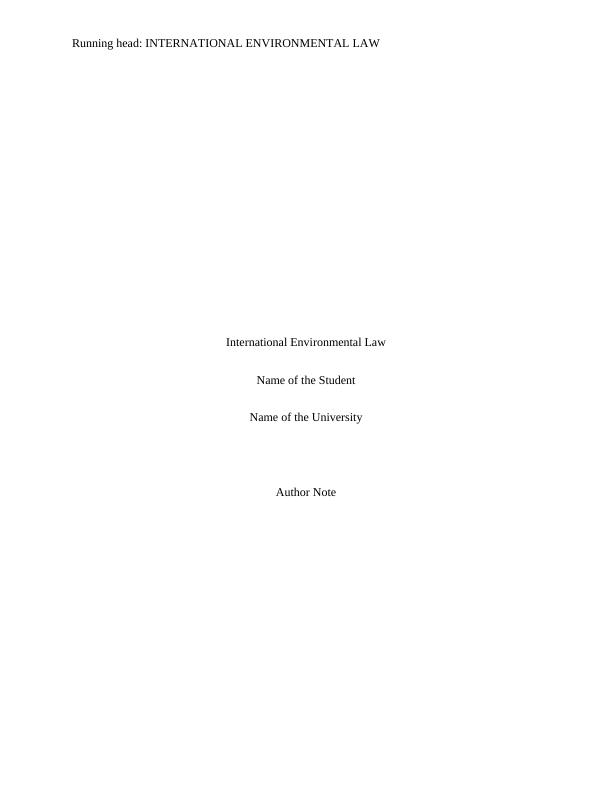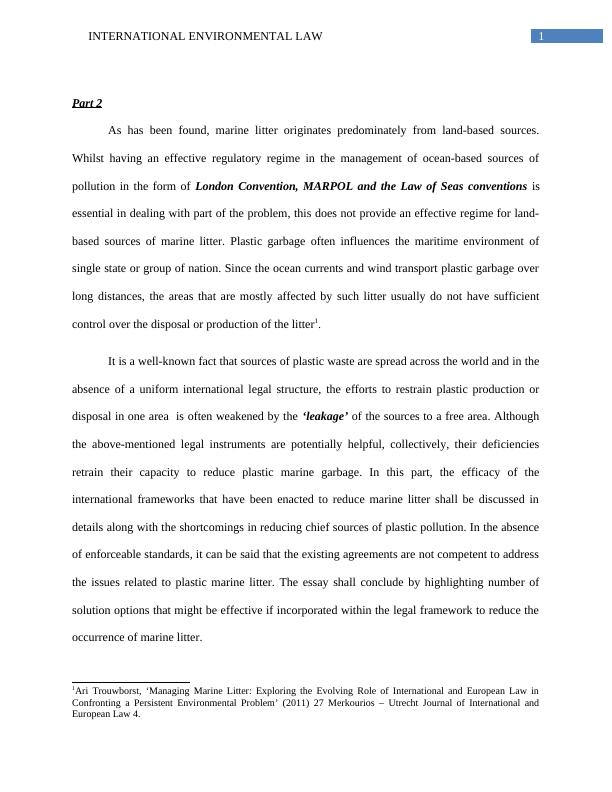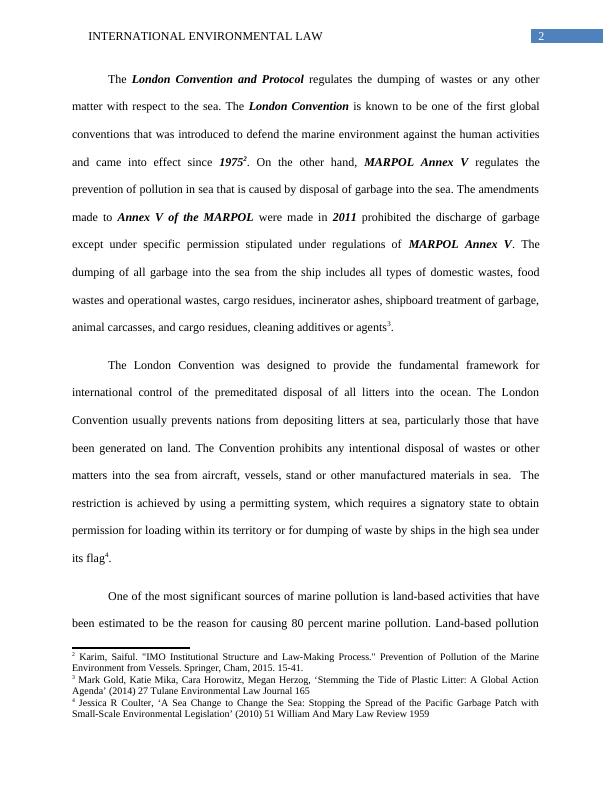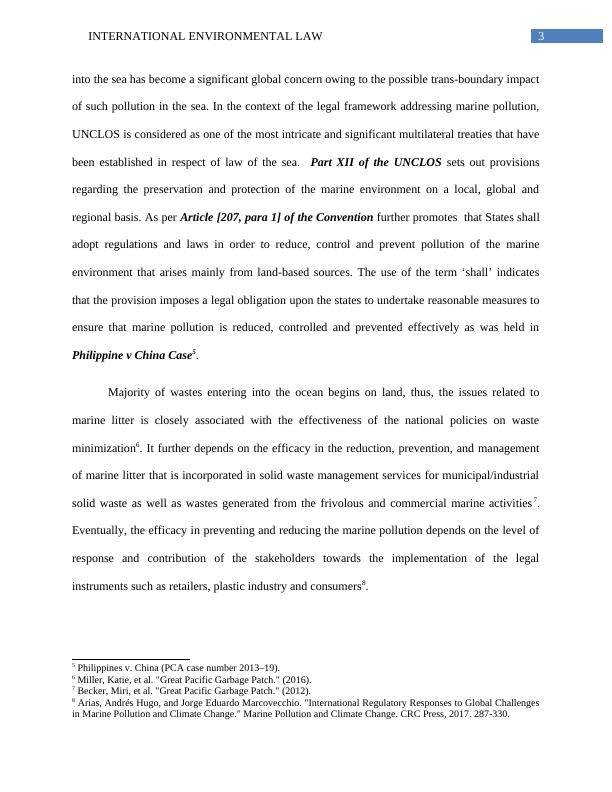International Environmental Law: Efficacy of Existing Frameworks in Reducing Marine Litter
16 Pages4110 Words395 Views
Added on 2023-06-11
About This Document
This essay discusses the efficacy of international frameworks in reducing marine litter and the shortcomings in reducing chief sources of plastic pollution. It also highlights solution options that might be effective if incorporated within the legal framework to reduce the occurrence of marine litter.
International Environmental Law: Efficacy of Existing Frameworks in Reducing Marine Litter
Added on 2023-06-11
ShareRelated Documents
Running head: INTERNATIONAL ENVIRONMENTAL LAW
International Environmental Law
Name of the Student
Name of the University
Author Note
International Environmental Law
Name of the Student
Name of the University
Author Note

1INTERNATIONAL ENVIRONMENTAL LAW
Part 2
As has been found, marine litter originates predominately from land-based sources.
Whilst having an effective regulatory regime in the management of ocean-based sources of
pollution in the form of London Convention, MARPOL and the Law of Seas conventions is
essential in dealing with part of the problem, this does not provide an effective regime for land-
based sources of marine litter. Plastic garbage often influences the maritime environment of
single state or group of nation. Since the ocean currents and wind transport plastic garbage over
long distances, the areas that are mostly affected by such litter usually do not have sufficient
control over the disposal or production of the litter1.
It is a well-known fact that sources of plastic waste are spread across the world and in the
absence of a uniform international legal structure, the efforts to restrain plastic production or
disposal in one area is often weakened by the ‘leakage’ of the sources to a free area. Although
the above-mentioned legal instruments are potentially helpful, collectively, their deficiencies
retrain their capacity to reduce plastic marine garbage. In this part, the efficacy of the
international frameworks that have been enacted to reduce marine litter shall be discussed in
details along with the shortcomings in reducing chief sources of plastic pollution. In the absence
of enforceable standards, it can be said that the existing agreements are not competent to address
the issues related to plastic marine litter. The essay shall conclude by highlighting number of
solution options that might be effective if incorporated within the legal framework to reduce the
occurrence of marine litter.
1Ari Trouwborst, ‘Managing Marine Litter: Exploring the Evolving Role of International and European Law in
Confronting a Persistent Environmental Problem’ (2011) 27 Merkourios – Utrecht Journal of International and
European Law 4.
Part 2
As has been found, marine litter originates predominately from land-based sources.
Whilst having an effective regulatory regime in the management of ocean-based sources of
pollution in the form of London Convention, MARPOL and the Law of Seas conventions is
essential in dealing with part of the problem, this does not provide an effective regime for land-
based sources of marine litter. Plastic garbage often influences the maritime environment of
single state or group of nation. Since the ocean currents and wind transport plastic garbage over
long distances, the areas that are mostly affected by such litter usually do not have sufficient
control over the disposal or production of the litter1.
It is a well-known fact that sources of plastic waste are spread across the world and in the
absence of a uniform international legal structure, the efforts to restrain plastic production or
disposal in one area is often weakened by the ‘leakage’ of the sources to a free area. Although
the above-mentioned legal instruments are potentially helpful, collectively, their deficiencies
retrain their capacity to reduce plastic marine garbage. In this part, the efficacy of the
international frameworks that have been enacted to reduce marine litter shall be discussed in
details along with the shortcomings in reducing chief sources of plastic pollution. In the absence
of enforceable standards, it can be said that the existing agreements are not competent to address
the issues related to plastic marine litter. The essay shall conclude by highlighting number of
solution options that might be effective if incorporated within the legal framework to reduce the
occurrence of marine litter.
1Ari Trouwborst, ‘Managing Marine Litter: Exploring the Evolving Role of International and European Law in
Confronting a Persistent Environmental Problem’ (2011) 27 Merkourios – Utrecht Journal of International and
European Law 4.

2INTERNATIONAL ENVIRONMENTAL LAW
The London Convention and Protocol regulates the dumping of wastes or any other
matter with respect to the sea. The London Convention is known to be one of the first global
conventions that was introduced to defend the marine environment against the human activities
and came into effect since 19752. On the other hand, MARPOL Annex V regulates the
prevention of pollution in sea that is caused by disposal of garbage into the sea. The amendments
made to Annex V of the MARPOL were made in 2011 prohibited the discharge of garbage
except under specific permission stipulated under regulations of MARPOL Annex V. The
dumping of all garbage into the sea from the ship includes all types of domestic wastes, food
wastes and operational wastes, cargo residues, incinerator ashes, shipboard treatment of garbage,
animal carcasses, and cargo residues, cleaning additives or agents3.
The London Convention was designed to provide the fundamental framework for
international control of the premeditated disposal of all litters into the ocean. The London
Convention usually prevents nations from depositing litters at sea, particularly those that have
been generated on land. The Convention prohibits any intentional disposal of wastes or other
matters into the sea from aircraft, vessels, stand or other manufactured materials in sea. The
restriction is achieved by using a permitting system, which requires a signatory state to obtain
permission for loading within its territory or for dumping of waste by ships in the high sea under
its flag4.
One of the most significant sources of marine pollution is land-based activities that have
been estimated to be the reason for causing 80 percent marine pollution. Land-based pollution
2 Karim, Saiful. "IMO Institutional Structure and Law-Making Process." Prevention of Pollution of the Marine
Environment from Vessels. Springer, Cham, 2015. 15-41.
3 Mark Gold, Katie Mika, Cara Horowitz, Megan Herzog, ‘Stemming the Tide of Plastic Litter: A Global Action
Agenda’ (2014) 27 Tulane Environmental Law Journal 165
4 Jessica R Coulter, ‘A Sea Change to Change the Sea: Stopping the Spread of the Pacific Garbage Patch with
Small-Scale Environmental Legislation’ (2010) 51 William And Mary Law Review 1959
The London Convention and Protocol regulates the dumping of wastes or any other
matter with respect to the sea. The London Convention is known to be one of the first global
conventions that was introduced to defend the marine environment against the human activities
and came into effect since 19752. On the other hand, MARPOL Annex V regulates the
prevention of pollution in sea that is caused by disposal of garbage into the sea. The amendments
made to Annex V of the MARPOL were made in 2011 prohibited the discharge of garbage
except under specific permission stipulated under regulations of MARPOL Annex V. The
dumping of all garbage into the sea from the ship includes all types of domestic wastes, food
wastes and operational wastes, cargo residues, incinerator ashes, shipboard treatment of garbage,
animal carcasses, and cargo residues, cleaning additives or agents3.
The London Convention was designed to provide the fundamental framework for
international control of the premeditated disposal of all litters into the ocean. The London
Convention usually prevents nations from depositing litters at sea, particularly those that have
been generated on land. The Convention prohibits any intentional disposal of wastes or other
matters into the sea from aircraft, vessels, stand or other manufactured materials in sea. The
restriction is achieved by using a permitting system, which requires a signatory state to obtain
permission for loading within its territory or for dumping of waste by ships in the high sea under
its flag4.
One of the most significant sources of marine pollution is land-based activities that have
been estimated to be the reason for causing 80 percent marine pollution. Land-based pollution
2 Karim, Saiful. "IMO Institutional Structure and Law-Making Process." Prevention of Pollution of the Marine
Environment from Vessels. Springer, Cham, 2015. 15-41.
3 Mark Gold, Katie Mika, Cara Horowitz, Megan Herzog, ‘Stemming the Tide of Plastic Litter: A Global Action
Agenda’ (2014) 27 Tulane Environmental Law Journal 165
4 Jessica R Coulter, ‘A Sea Change to Change the Sea: Stopping the Spread of the Pacific Garbage Patch with
Small-Scale Environmental Legislation’ (2010) 51 William And Mary Law Review 1959

3INTERNATIONAL ENVIRONMENTAL LAW
into the sea has become a significant global concern owing to the possible trans-boundary impact
of such pollution in the sea. In the context of the legal framework addressing marine pollution,
UNCLOS is considered as one of the most intricate and significant multilateral treaties that have
been established in respect of law of the sea. Part XII of the UNCLOS sets out provisions
regarding the preservation and protection of the marine environment on a local, global and
regional basis. As per Article [207, para 1] of the Convention further promotes that States shall
adopt regulations and laws in order to reduce, control and prevent pollution of the marine
environment that arises mainly from land-based sources. The use of the term ‘shall’ indicates
that the provision imposes a legal obligation upon the states to undertake reasonable measures to
ensure that marine pollution is reduced, controlled and prevented effectively as was held in
Philippine v China Case5.
Majority of wastes entering into the ocean begins on land, thus, the issues related to
marine litter is closely associated with the effectiveness of the national policies on waste
minimization6. It further depends on the efficacy in the reduction, prevention, and management
of marine litter that is incorporated in solid waste management services for municipal/industrial
solid waste as well as wastes generated from the frivolous and commercial marine activities7.
Eventually, the efficacy in preventing and reducing the marine pollution depends on the level of
response and contribution of the stakeholders towards the implementation of the legal
instruments such as retailers, plastic industry and consumers8.
5 Philippines v. China (PCA case number 2013–19).
6 Miller, Katie, et al. "Great Pacific Garbage Patch." (2016).
7 Becker, Miri, et al. "Great Pacific Garbage Patch." (2012).
8 Arias, Andrés Hugo, and Jorge Eduardo Marcovecchio. "International Regulatory Responses to Global Challenges
in Marine Pollution and Climate Change." Marine Pollution and Climate Change. CRC Press, 2017. 287-330.
into the sea has become a significant global concern owing to the possible trans-boundary impact
of such pollution in the sea. In the context of the legal framework addressing marine pollution,
UNCLOS is considered as one of the most intricate and significant multilateral treaties that have
been established in respect of law of the sea. Part XII of the UNCLOS sets out provisions
regarding the preservation and protection of the marine environment on a local, global and
regional basis. As per Article [207, para 1] of the Convention further promotes that States shall
adopt regulations and laws in order to reduce, control and prevent pollution of the marine
environment that arises mainly from land-based sources. The use of the term ‘shall’ indicates
that the provision imposes a legal obligation upon the states to undertake reasonable measures to
ensure that marine pollution is reduced, controlled and prevented effectively as was held in
Philippine v China Case5.
Majority of wastes entering into the ocean begins on land, thus, the issues related to
marine litter is closely associated with the effectiveness of the national policies on waste
minimization6. It further depends on the efficacy in the reduction, prevention, and management
of marine litter that is incorporated in solid waste management services for municipal/industrial
solid waste as well as wastes generated from the frivolous and commercial marine activities7.
Eventually, the efficacy in preventing and reducing the marine pollution depends on the level of
response and contribution of the stakeholders towards the implementation of the legal
instruments such as retailers, plastic industry and consumers8.
5 Philippines v. China (PCA case number 2013–19).
6 Miller, Katie, et al. "Great Pacific Garbage Patch." (2016).
7 Becker, Miri, et al. "Great Pacific Garbage Patch." (2012).
8 Arias, Andrés Hugo, and Jorge Eduardo Marcovecchio. "International Regulatory Responses to Global Challenges
in Marine Pollution and Climate Change." Marine Pollution and Climate Change. CRC Press, 2017. 287-330.

End of preview
Want to access all the pages? Upload your documents or become a member.
Related Documents
Policy brief on pollution in oceanslg...
|12
|3539
|124
Maritime Policy: International Conventions and Pollution Preventionlg...
|12
|3422
|69
Identification of Optimal Disposal Options for Derelict Ships and Boats Research Proposal 2022lg...
|14
|2985
|20
Litter: Causes, Impacts, and Solutionslg...
|11
|2795
|22
water pollutionlg...
|8
|517
|61
Constraints of Flag, Port and Coastal Stateslg...
|10
|3079
|108
